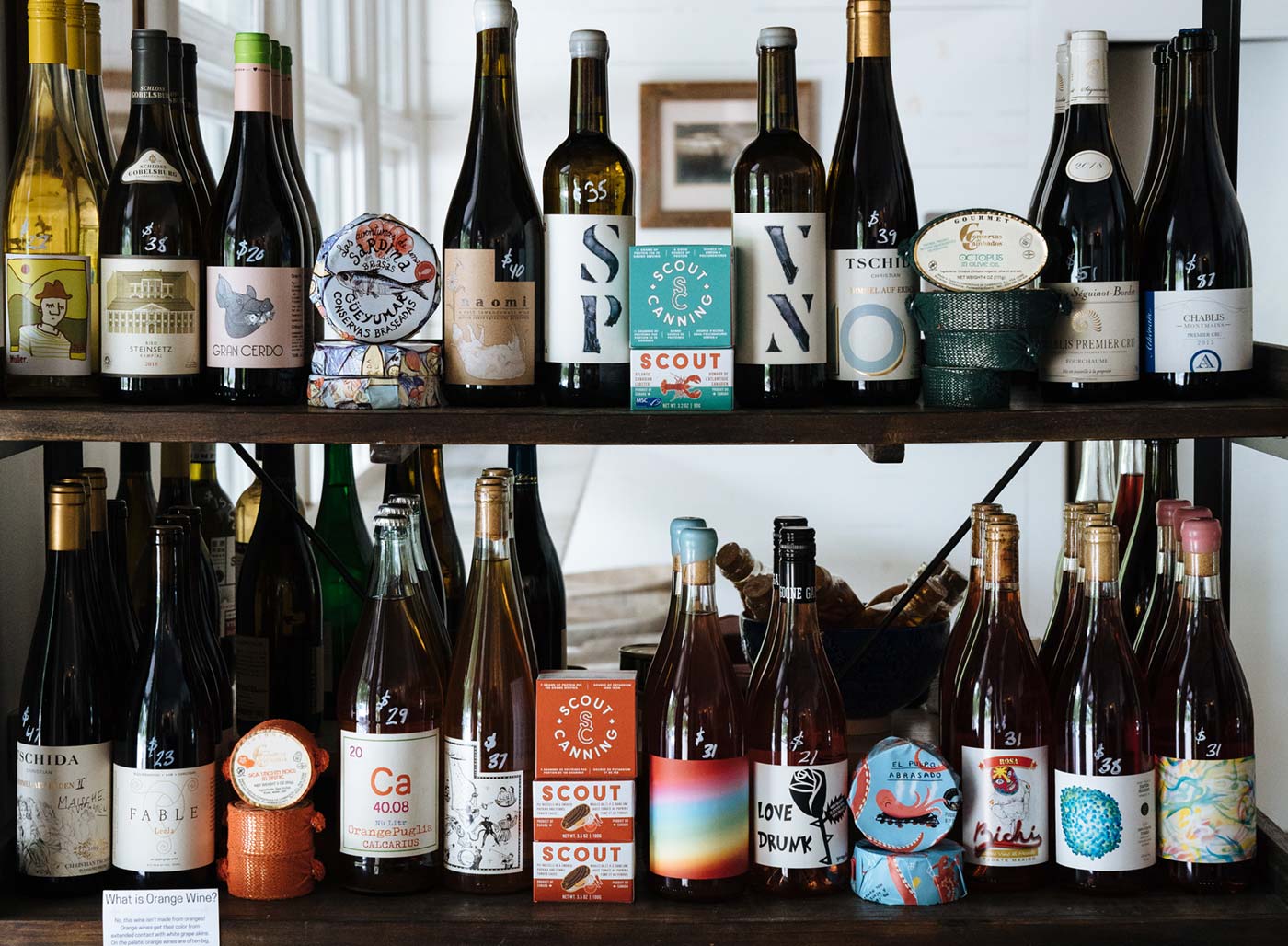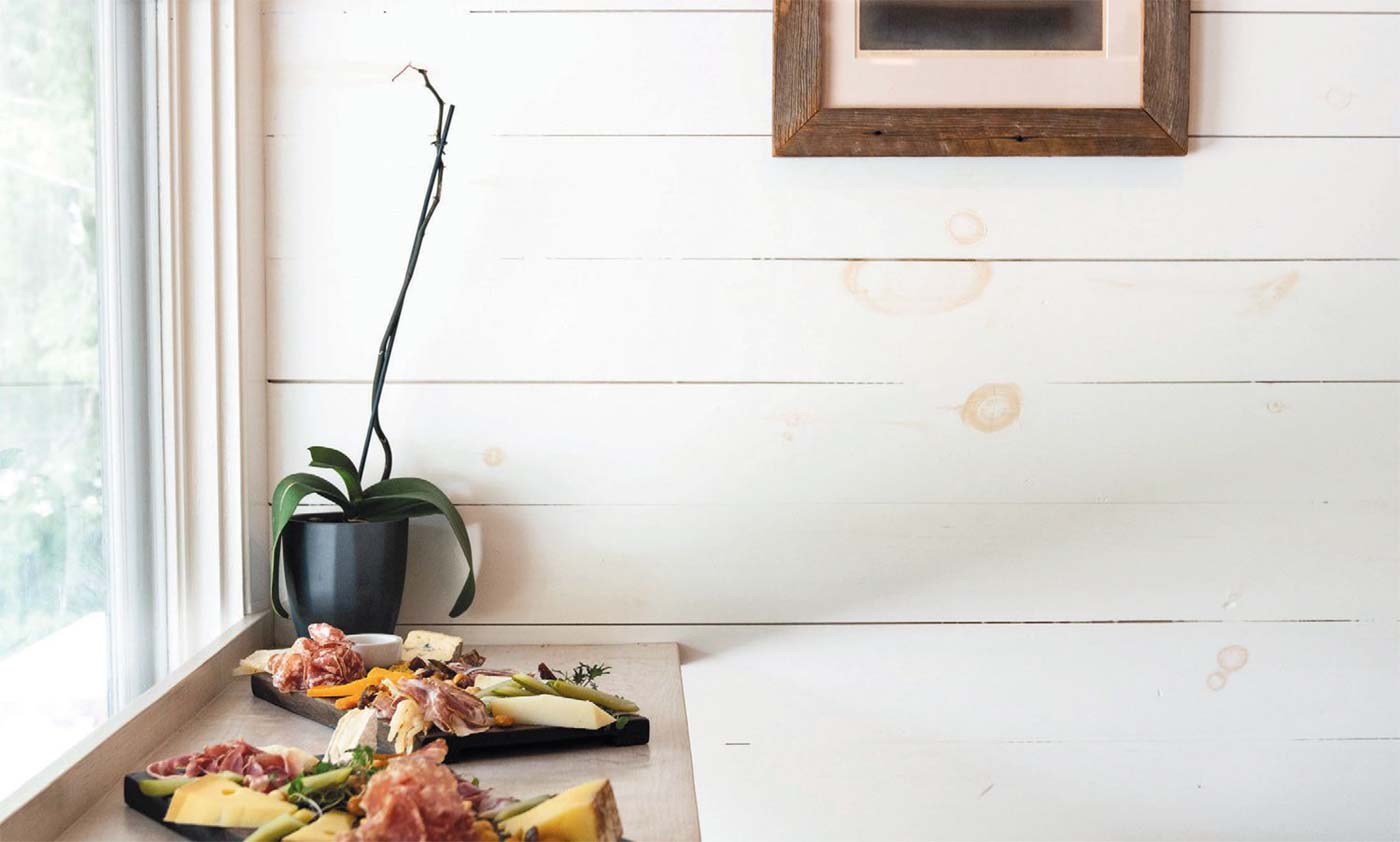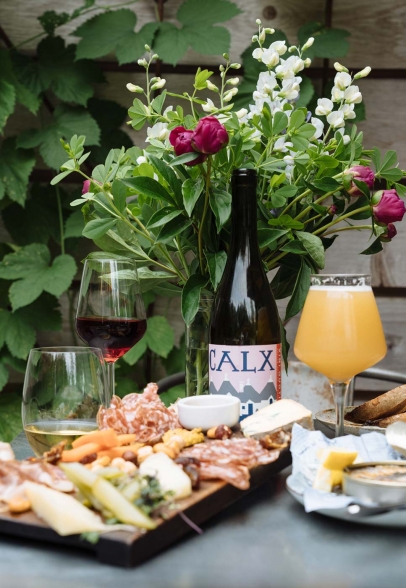The Crooked Ram: Committed to Craft
When Kolton Niesen surveys the shelves of The Crooked Ram, he sees people and places, not mere bottles of wine. Pick any bottle, and he can share the story of the maker and the terroir that create a unique beverage. “We carry some fairly obscure selections from smaller producers, but that keeps it fun. When tasting wines, we ask ourselves, ‘Does it sing? Does it hit that unique note?’ I love offering samples to encourage our customers to try something different. You just ordered a chardonnay, but here, try this chilled sparkling red from central Vermont.”
Kolton stocks both traditional and natural wines (produced without herbicides or pesticides) and pét-nat (pétillant naturel, a method that can create carbonation in alcoholic beverages without the addition of extra yeast and sugar) ciders. “Because natural wines and ciders are acid-driven, mostly dry, and refreshingly light, they interact well with nearly every style of food. When you taste these sparkling wines from La Garagista, Fable Farm, and Iapetus at Shelburne Vineyards, you taste pure magic. I would drink any of these wines over hundred-dollar vintage bottles.”
Lovers of craft beer flock here as well, knowing they can select from a rotation of super-fresh draft beers or pick up four-packs to go. “We always have three IPAs, a pilsner, a red or amber, a sour beer, and a cider on tap,” Kolton explains. As with wines, he supports smaller producers including Red Clover, Wunderkammer, and Schilling. White, red, orange, and rosé wines as well as sake are available by the glass.
A trio of friends and their close-knit team, who all have a deep appreciation of craft, run The Crooked Ram, located in Manchester Village a few steps away from the Orvis flagship store. That ethos drives them to source from local farms and small producers: wood-fired bread from Rupert Rising, organic produce from Mighty Food Farm and Clear Brook Farm, cheese from Vermont’s best makers. Peter Campbell, the owner and operator, has a background in visual arts and music production. He moved to Manchester from Brooklyn with a dream of opening a gathering place, a nexus for people who commit their lives to their craft: producing food and drink, farming, and creating art and music. “These folks operate on a different wavelength,” Peter observes. “These are the people who inspire us to keep dreaming.”
Peter opened The Ram, as it’s known locally, in February 2017. “I had this vision but no idea what I was doing,” he admits. At that point, the food program consisted of cheese and charcuterie boards and “whatever I could make with a Breville toaster,” Peter laughs. “Kolton had come in a few times and saw I was drowning. One day, I had a line out the door. He jumped behind the counter, pulled on gloves, and helped me crank out orders.” A culinary school graduate with 20 years of restaurant experience, Kolton now serves as general managing partner.
Nevin Taylor, also an appreciative customer and a chef who spent 15 years in top Boston establishments, came on board as The Ram’s executive chef in June 2020. “I saw how I could fit in and what the future would be here. I had immediate clarity and felt the synergy. I love that we’re pouring what we want to drink and cooking what we want to eat.” That translates to the most innovative food and drink offerings in southern Vermont.
Kolton agrees. “We’re able to create and evolve because of our relatively small scale. In a world where we have zero control over so many things, it’s nice to make decisions based on what we like. If we love what we’re doing, our customers will feel that passion.”

“ I saw how I could fit in and what the future would be here. I had immediate clarity and felt the synergy. I love that we’re pouring what we want to drink and cooking what we want to eat.” –Nevin Taylor, executive chef, The Crooked Ram
In September, The Crooked Ram unveiled a major outdoor expansion known as The Yard, a handsome post-and-beam pavilion. Located behind the low-slung main building, this open-sided structure now serves as Nevin’s culinary palace, featuring an outdoor kitchen comprised of an Italian woodburning oven, Japanese binchotan charcoal grills, and a raw bar. Guests descend a floating, handcrafted steel staircase and settle in to dine al fresco, surrounded by a sculpted trellis and strings of lights, or under the pavilion’s roof. With a keen eye for design, Peter has created a zen-like ambience using steel, stone, and natural wood, with native landscaping from Mettowee Mint, a garden center in Dorset.
This same minimalist aesthetic infuses Nevin’s cooking: rustic Mediterranean-influenced dishes prepared with the exacting precision of a Japanese chef. “Food and drink can teach you about the world’s cultures. It’s appreciation, not appropriation,” Nevin says. Th e beauty comes through in a dish’s apparent simplicity yet demands— and rewards—the highest-quality local ingredients. It’s taken a lifetime of classical training to merge disparate methods and to develop stylistic riffs. “We’re honing our identity with the food Nevin is making,” says Peter.
Nevin’s seasonal dishes transport diners to faraway locales. A bite of his summer pan con tomate—perfectly toasted sourdough kissed by fresh garlic then topped with grated summer-ripe tomato, fruity olive oil, and flaky sea salt—is pure Mediterranean sunshine. Or translucent beef carpaccio arranged atop grilled leeks and eggplant and chanterelles lightly seasoned with olive oil and sherry vinegar. Now in fall, Nevin teases inherent sweetness from winter squash, embraces the minerality of sturdy bitter greens, and celebrates earthy root vegetables.
From the wood-burning oven, Nevin pulls Neapolitan-style pizzas topped with local vegetables, herbs, and meats. He’s created his own custom blend of organic flours for the dough, including King Arthur Flour and Nitty Gritty Grain Company. For the cheese? “I tasted every possible mozzarella from the United States and Italy and finally found an exceptional one made from water buffalo milk.”
Nevin praises the binchotan grill, a petite fire box that uses highly compressed Japanese charcoal made in the Buddhist tradition using fallen branches of wood rather than hewn trees. “This charcoal burns extremely hot, steady, and clean and emits no toxins, only pure woodfired flavor,” Nevin confirms. Last spring, he grilled marinated guinea hen legs and breasts alongside shaved hakurei turnips brushed with ramp butter. In high summer, skewers of blistered cherry tomatoes accompanied seared swordfish chunks. Fatty pork shoulder steaks glazed with fish sauce caramel recently saw their turn on the binchotan.
The raw bar features the freshest shellfish and seafood direct from New England waters, delivered daily from Boston by Manchester’s Earth & Sea Market. What could be better than tucking into a platter of briny sweet oysters harvested the previous day, or a plate of succulent crudo, with a crisp Spanish albariño, a mineral-forward Basque txakoli, or a refreshing Czech-style pilsner?
By November, a pair of full-service dining rooms will open in the original building that fronts Main Street. Dining will transition indoors through spring, although the team can easily shift outdoors if the weather cooperates or indoor dining is curtailed. “We’re stoked to finally have this variety of spaces to branch out and do what we’ve been dreaming of,” Peter says. “It’s been a highly collaborative process, and we’re committed to providing a safe, welcoming space where people can gather and put aside their worries for a bit. We truly believe that dining together is one of the most important rituals people can share.”
“We’re committed to providing a safe, welcoming space where people can gather and put aside their worries for a bit. We truly believe that dining together is one of the most important rituals people can share.” –Peter Campbell, owner, The Crooked Ram






